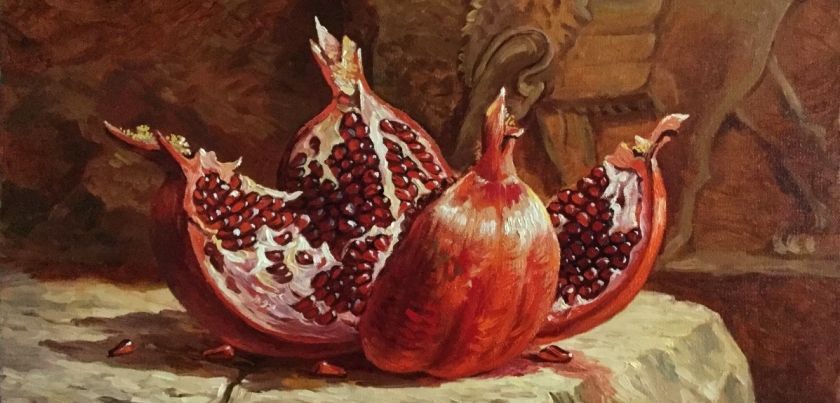 In this suspenseful mystery by Edith Wharton, a young woman marries a recently widowed man who admits to having been intensely in love with his deceased wife of twelve years. Everything seems perfect until a series of strange letters arrive, addressed to the husband in obviously feminine handwriting. The letters deeply disturb the husband, who refuses to disclose the sender or the contents. When the husband disappears and the secret of the letters is revealed, it appears that his dead wife may have won a ghostly contest. Themes: love, family, jealousy, honesty and mutual trust in marriage, alienation, he supernatural. More…
In this suspenseful mystery by Edith Wharton, a young woman marries a recently widowed man who admits to having been intensely in love with his deceased wife of twelve years. Everything seems perfect until a series of strange letters arrive, addressed to the husband in obviously feminine handwriting. The letters deeply disturb the husband, who refuses to disclose the sender or the contents. When the husband disappears and the secret of the letters is revealed, it appears that his dead wife may have won a ghostly contest. Themes: love, family, jealousy, honesty and mutual trust in marriage, alienation, he supernatural. More…
Category Archives: Novelettes
Victory Over Japan
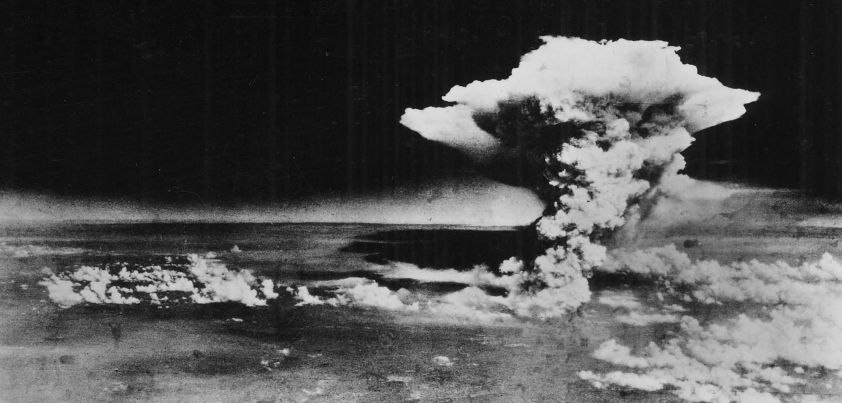 Today we are featuring the trilogy of “Rhoda” stories from Ellen Gilchrist’s short story collection Victory Over Japan. In the titular first story, set in the final days of World War 2, Rhoda is a willful third-grader living in fear of when her disciplinarian father returns home from the war. In the second story, Music, she is a rebellious fourteen-year-old, obsessed with beauty and romance and constantly at war with her father. In the final story, The Lower Garden District Free Gravity Mule Blight or Rhoda, a Fable, she is a lost thirty-four-year-old at a crossroads. More…
Today we are featuring the trilogy of “Rhoda” stories from Ellen Gilchrist’s short story collection Victory Over Japan. In the titular first story, set in the final days of World War 2, Rhoda is a willful third-grader living in fear of when her disciplinarian father returns home from the war. In the second story, Music, she is a rebellious fourteen-year-old, obsessed with beauty and romance and constantly at war with her father. In the final story, The Lower Garden District Free Gravity Mule Blight or Rhoda, a Fable, she is a lost thirty-four-year-old at a crossroads. More…
What Men Live By
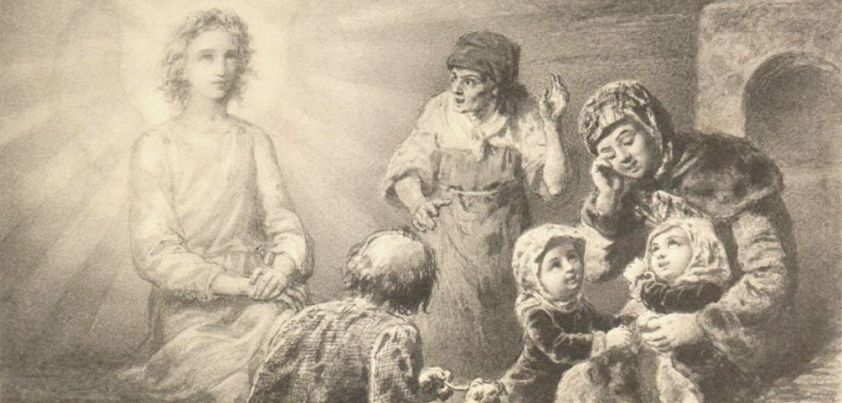 In this story by Leo Tolstoy, God punishes a disobedient angel by casting him out of Heaven to live as a man. The only way he can get his job back is to learn the answers these questions: What dwells in man? What is not given to man? and What (do) men live by? He learns the answers from the family of a poor but compassionate shoemaker, an imperious rich man, and a kind, charitable woman who has adopted the two orphaned children of a dead neighbor. Themes: humanity, compassion, kindness, arrogance, duty, death. More…
In this story by Leo Tolstoy, God punishes a disobedient angel by casting him out of Heaven to live as a man. The only way he can get his job back is to learn the answers these questions: What dwells in man? What is not given to man? and What (do) men live by? He learns the answers from the family of a poor but compassionate shoemaker, an imperious rich man, and a kind, charitable woman who has adopted the two orphaned children of a dead neighbor. Themes: humanity, compassion, kindness, arrogance, duty, death. More…
Leaving the Yellow House
 In this depressing but captivating story by Saul Bellow, a seventy-two-year-old woman reviews her life of lost opportunities after an accident threatens her ability to live independently in her off-the-grid Yellow House. A heavy drinker, she is portrayed as irresponsible, selfish, brash and demanding. With no close relatives and the six other eccentric white people in her isolated desert community tolerating rather than befriending her, she has no one to turn to and, more importantly, nobody “good enough” to bequeath her only treasure (the house) to. Themes include poverty, aging and death, identity, self-deception, alienation and isolation, disconnection, alcohol abuse. More…
In this depressing but captivating story by Saul Bellow, a seventy-two-year-old woman reviews her life of lost opportunities after an accident threatens her ability to live independently in her off-the-grid Yellow House. A heavy drinker, she is portrayed as irresponsible, selfish, brash and demanding. With no close relatives and the six other eccentric white people in her isolated desert community tolerating rather than befriending her, she has no one to turn to and, more importantly, nobody “good enough” to bequeath her only treasure (the house) to. Themes include poverty, aging and death, identity, self-deception, alienation and isolation, disconnection, alcohol abuse. More…
The Learned Adventure of the Dragon’s Head
 Lord Peter Wimsey, Dorothy Sayers’s eccentric amateur sleuth, is saddled with his ten-year-old nephew while his parents are away overseas. As the two browse an antiquarian bookshop, the boy is attracted to the maps and pictures in a badly damaged copy of Cosmographia Universalis, an early description of the world. He buys the book, and shortly afterwards a strange man visits and offers Wimsey two hundred times what the boy paid. This leads to a “Boys Own” type adventure involving attempted robbery, Scotland Yard and a riddle leading to buried pirate treasure. Themes include curiosity, greed, mystery, deception, and philanthropy. More…
Lord Peter Wimsey, Dorothy Sayers’s eccentric amateur sleuth, is saddled with his ten-year-old nephew while his parents are away overseas. As the two browse an antiquarian bookshop, the boy is attracted to the maps and pictures in a badly damaged copy of Cosmographia Universalis, an early description of the world. He buys the book, and shortly afterwards a strange man visits and offers Wimsey two hundred times what the boy paid. This leads to a “Boys Own” type adventure involving attempted robbery, Scotland Yard and a riddle leading to buried pirate treasure. Themes include curiosity, greed, mystery, deception, and philanthropy. More…
A Circle in the Fire
 In this story by Flannery O’Connor, a self-righteous widow who runs a large farm with an iron hand is visited by three teenage boys. One of them is the son of an ex-employee, ostensibly seeking a horse ride. She refuses the request, but allows them to camp overnight. The next morning, angered by her condescending attitude, the boys do not leave and spend the next two days committing petty acts of vandalism around the farm. A threat to call the sheriff results in her greatest fear: fire. Themes include authoritarianism, pride, fear, false piety, ignorance, resentment, defiance, powerlessness. More…
In this story by Flannery O’Connor, a self-righteous widow who runs a large farm with an iron hand is visited by three teenage boys. One of them is the son of an ex-employee, ostensibly seeking a horse ride. She refuses the request, but allows them to camp overnight. The next morning, angered by her condescending attitude, the boys do not leave and spend the next two days committing petty acts of vandalism around the farm. A threat to call the sheriff results in her greatest fear: fire. Themes include authoritarianism, pride, fear, false piety, ignorance, resentment, defiance, powerlessness. More…
The Canterville Ghost
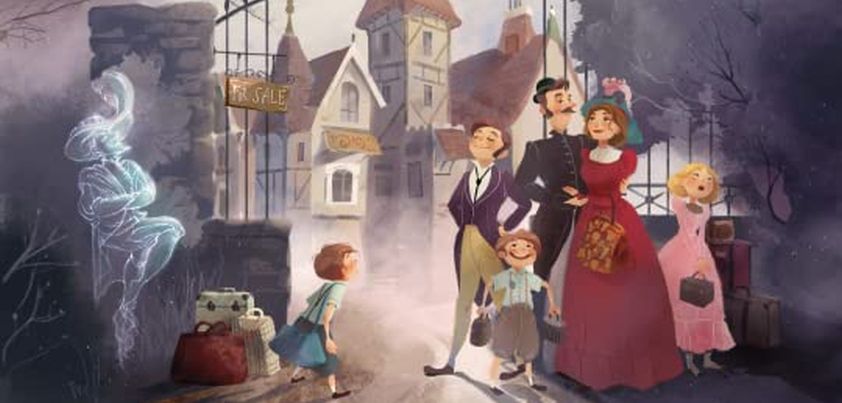 Oscar Wilde is known for his comedic, usually satirical stories that focus on the shallowness and hypocrisy of the Victorian upper class. He goes several steps further in this playful ghost story, also mocking the brash practicality of wealthy Americans and some of the common devices used in horror and romantic literature. A fascinating aspect of the plot is the way Wilde builds sympathy for his spectral protagonist before revealing the petty reason the cruel man murdered his unfortunate wife. Themes: (general) British vs American culture, tradition, compassion; (the ghost) duty, artistry, suffering, atonement, redemption, peace. More…
Oscar Wilde is known for his comedic, usually satirical stories that focus on the shallowness and hypocrisy of the Victorian upper class. He goes several steps further in this playful ghost story, also mocking the brash practicality of wealthy Americans and some of the common devices used in horror and romantic literature. A fascinating aspect of the plot is the way Wilde builds sympathy for his spectral protagonist before revealing the petty reason the cruel man murdered his unfortunate wife. Themes: (general) British vs American culture, tradition, compassion; (the ghost) duty, artistry, suffering, atonement, redemption, peace. More…
Youth
 This story from Joseph Conrad is more than a survival tale about an unseaworthy ship beset by bad luck. Central themes are youthful exuberance bordering on recklessness, regret for its passing, and the romance of the sea. The explosion that sinks the vessel marks a turning point for a young ship’s officer. Up until then, his enthusiasm had been fueled by a youthful desire to experience the wonders of the East. He discovers a new side of himself (leadership ability) when he temporarily takes command of the crew’s evacuation to the lifeboats. Other themes: courage, duty, misfortune, survival, self-discovery, pride. More…
This story from Joseph Conrad is more than a survival tale about an unseaworthy ship beset by bad luck. Central themes are youthful exuberance bordering on recklessness, regret for its passing, and the romance of the sea. The explosion that sinks the vessel marks a turning point for a young ship’s officer. Up until then, his enthusiasm had been fueled by a youthful desire to experience the wonders of the East. He discovers a new side of himself (leadership ability) when he temporarily takes command of the crew’s evacuation to the lifeboats. Other themes: courage, duty, misfortune, survival, self-discovery, pride. More…
The Argentine Ant
 This story from Italo Calvino starts off aslike a horror story. A young couple with a baby move to a peaceful seaside village looking for work, only to discover that the whole place is crawling with ants. After they find the baby covered in ants and their food destroyed, Calvino takes a playful turn. He goes on to describe the sometimes farcical ways villagers try to exterminate and/or pretend they are not affected by the invaders, and the couple’s embarrassing confrontation with the reportedly self-serving government “Ant Man”. Themes: co-existing with nature, powerlessness, futility, tolerance/accepting the inevitable, mob hysteria. More…
This story from Italo Calvino starts off aslike a horror story. A young couple with a baby move to a peaceful seaside village looking for work, only to discover that the whole place is crawling with ants. After they find the baby covered in ants and their food destroyed, Calvino takes a playful turn. He goes on to describe the sometimes farcical ways villagers try to exterminate and/or pretend they are not affected by the invaders, and the couple’s embarrassing confrontation with the reportedly self-serving government “Ant Man”. Themes: co-existing with nature, powerlessness, futility, tolerance/accepting the inevitable, mob hysteria. More…
Odour of Chrysanthemums
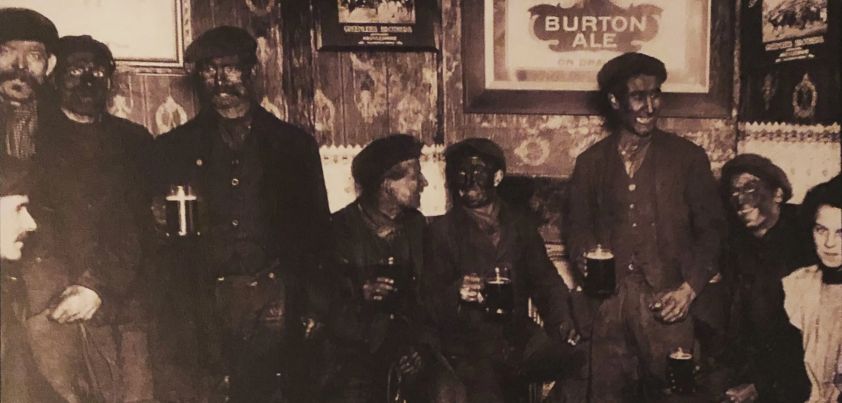 D. H. Lawrence’s Odour of Chrysanthemums begins with an introduction to a woman living in a coal-mining village who feels trapped in an unhappy world of her husband’s making. Although her father is working-class (an engine-driver), her speech and behavior suggest that she aspires to a better life. The accidental death of her husband (a miner) triggers an epiphany in which she realizes that they never really knew each other, and that their problems were equally of her own making. The main theme is superficial (physical) attraction vs. love. Other themes: industrialization, social class, sex roles, isolation, mother-child connections, death. More…
D. H. Lawrence’s Odour of Chrysanthemums begins with an introduction to a woman living in a coal-mining village who feels trapped in an unhappy world of her husband’s making. Although her father is working-class (an engine-driver), her speech and behavior suggest that she aspires to a better life. The accidental death of her husband (a miner) triggers an epiphany in which she realizes that they never really knew each other, and that their problems were equally of her own making. The main theme is superficial (physical) attraction vs. love. Other themes: industrialization, social class, sex roles, isolation, mother-child connections, death. More…
The Ghost upon the Rail
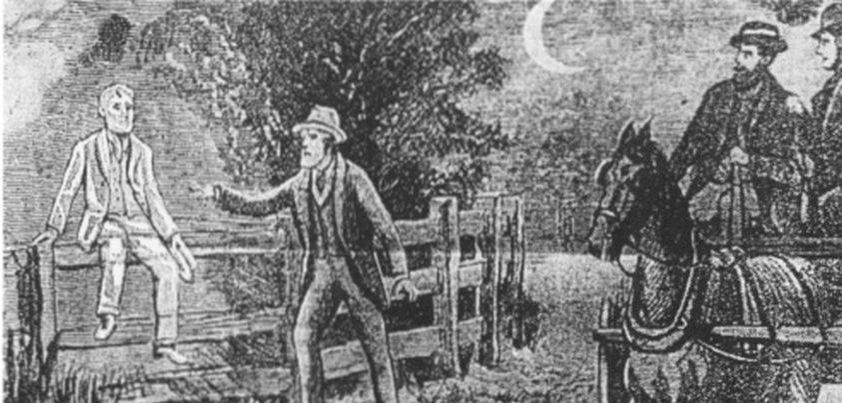 This supposedly true story by John Lang is set in the early 1800s. John Fisher had come to Australia as a convict. He worked hard, won his freedom and became rich. One day a neighbor tells everyone that Fisher has returned to England. A year later, he says that Fisher has written asking him to sell all he owns and send the money to him. According to this version, at about the same time three men (one a policeman) are returning home late one night. Sitting on a rail beside the road is Fisher’s ghost. This spoils the neighbor’s plan. More…
This supposedly true story by John Lang is set in the early 1800s. John Fisher had come to Australia as a convict. He worked hard, won his freedom and became rich. One day a neighbor tells everyone that Fisher has returned to England. A year later, he says that Fisher has written asking him to sell all he owns and send the money to him. According to this version, at about the same time three men (one a policeman) are returning home late one night. Sitting on a rail beside the road is Fisher’s ghost. This spoils the neighbor’s plan. More…
Interpreter of Maladies
 Interpreter of Maladies is the titular tale in Jhumpa Lahiri’s award-winning debut short story collection. The stories deal with different aspects of the cultural and relationship issues facing people of Indian heritage in the modern world. This story contrasts two empty marriages. The Indian protagonist (a doctor’s translator who moonlights as a tour guide) fantasizes that the wife in an Indian-American family he takes sightseeing has a romantic interest in him. Rather than love, she wants his help to find a “cure” for a foolish mistake she once made. Themes: parenting, loveless marriage, tragic loss, loneliness, low self-esteem, guilt. More…
Interpreter of Maladies is the titular tale in Jhumpa Lahiri’s award-winning debut short story collection. The stories deal with different aspects of the cultural and relationship issues facing people of Indian heritage in the modern world. This story contrasts two empty marriages. The Indian protagonist (a doctor’s translator who moonlights as a tour guide) fantasizes that the wife in an Indian-American family he takes sightseeing has a romantic interest in him. Rather than love, she wants his help to find a “cure” for a foolish mistake she once made. Themes: parenting, loveless marriage, tragic loss, loneliness, low self-esteem, guilt. More…
A Boy and His Dog
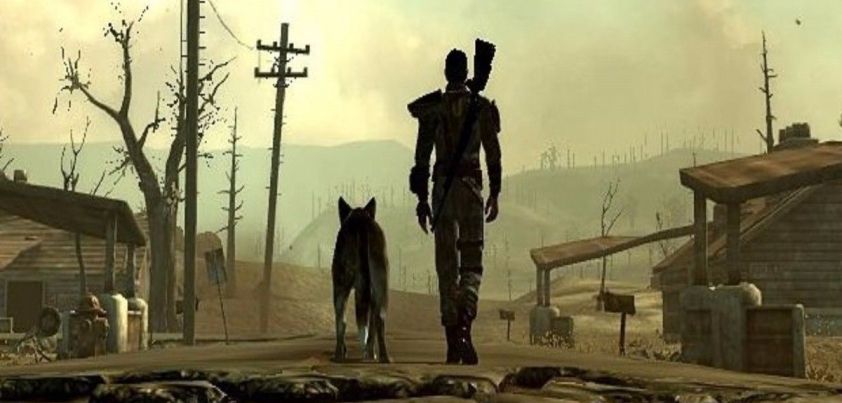 Written at the peak of the Cold War, this Harlan Ellison story takes place in a dystopic, post-apocalyptic world. ‘Civilized’ people have retreated to secure underground cities, leaving the desolate surface to ‘solo’ wanderers and lawless gangs who survive by foraging, violence and murder. The plot involves a young solo, his genetically manipulated telepathic dog, and an attractive young woman from the underground who almost comes between them. Despite the title, there is nothing “boyish” about the protagonist given what he and the girl get up to! Themes: anarchy, division, violence, loyalty, manipulation, betrayal, love. More…
Written at the peak of the Cold War, this Harlan Ellison story takes place in a dystopic, post-apocalyptic world. ‘Civilized’ people have retreated to secure underground cities, leaving the desolate surface to ‘solo’ wanderers and lawless gangs who survive by foraging, violence and murder. The plot involves a young solo, his genetically manipulated telepathic dog, and an attractive young woman from the underground who almost comes between them. Despite the title, there is nothing “boyish” about the protagonist given what he and the girl get up to! Themes: anarchy, division, violence, loyalty, manipulation, betrayal, love. More…
The Open Boat
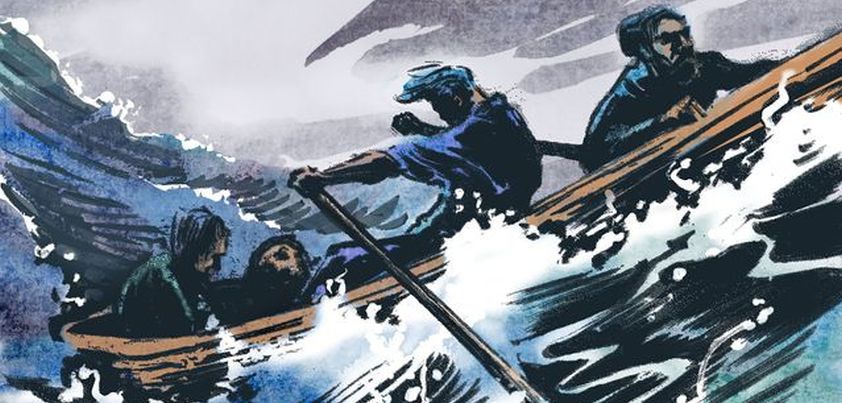 A remarkable aspect of this story from Stephen Crane is that it is based on an actual event in the author’s life. This adds credibility to what to me is a defining feature of the story: the way that throughout the ordeal four men from such diverse backgrounds were able to maintain their self-discipline and work so well together. The Open Boat is considered a classic in the literary style called “naturalism”. Such stories deal with the unforgiving power of nature and man’s struggle for survival. Themes: man vs. nature/the sea, perspective (appearance vs. reality), courage, teamwork, survival. More…
A remarkable aspect of this story from Stephen Crane is that it is based on an actual event in the author’s life. This adds credibility to what to me is a defining feature of the story: the way that throughout the ordeal four men from such diverse backgrounds were able to maintain their self-discipline and work so well together. The Open Boat is considered a classic in the literary style called “naturalism”. Such stories deal with the unforgiving power of nature and man’s struggle for survival. Themes: man vs. nature/the sea, perspective (appearance vs. reality), courage, teamwork, survival. More…
Nightfall
 As once described by Isaac Asimov himself, Nightfall (is) the tale of a world with eternal sun that is suddenly plunged into total darkness and utter madness. Hailed as one of the greatest Science Fiction stories ever written it tells how, in preparation for the potential end of their civilization, a group of forward-thinking scientists have created a safe place to store their world’s accumulated knowledge and hide a select group of “survivors”. Themes: science vs superstition (cultism), having the courage of one’s convictions, sensory deprivation, insanity, mob hysteria, scientific hubris. More…
As once described by Isaac Asimov himself, Nightfall (is) the tale of a world with eternal sun that is suddenly plunged into total darkness and utter madness. Hailed as one of the greatest Science Fiction stories ever written it tells how, in preparation for the potential end of their civilization, a group of forward-thinking scientists have created a safe place to store their world’s accumulated knowledge and hide a select group of “survivors”. Themes: science vs superstition (cultism), having the courage of one’s convictions, sensory deprivation, insanity, mob hysteria, scientific hubris. More…
Journey into a Dark Heart
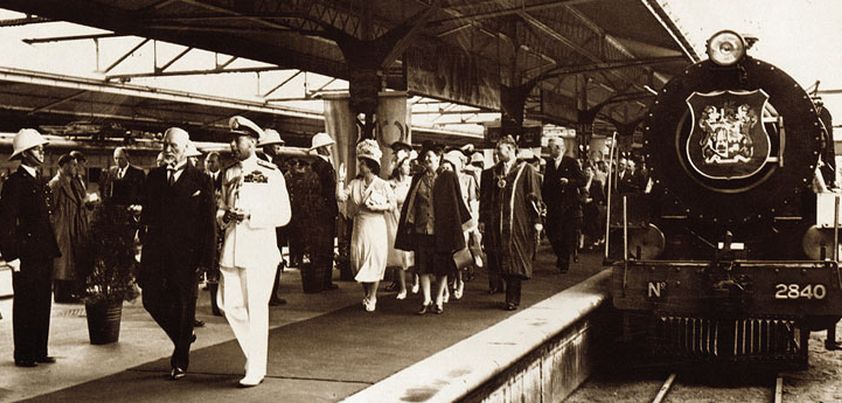 In this story by Peter Høeg, a naïve young mathematician becomes disillusioned at the impossibility of reducing all things (including humanity) to a set of equations. He gives up his academic career, joins a Danish trading company, and finds himself in Africa mixing with royalty at the opening of a new railroad. During the inaugural train journey, he discusses European notions of colonial Africa with three fellow passengers. He later learns that one is a rebel leader, another a gunrunner, and a bridge ahead has been sabotaged. Themes: colonialism, race and racism, war/rebellion, honesty, idealism vs. reality, despair. More…
In this story by Peter Høeg, a naïve young mathematician becomes disillusioned at the impossibility of reducing all things (including humanity) to a set of equations. He gives up his academic career, joins a Danish trading company, and finds himself in Africa mixing with royalty at the opening of a new railroad. During the inaugural train journey, he discusses European notions of colonial Africa with three fellow passengers. He later learns that one is a rebel leader, another a gunrunner, and a bridge ahead has been sabotaged. Themes: colonialism, race and racism, war/rebellion, honesty, idealism vs. reality, despair. More…
In the Zoo
 In this story by Jean Stafford, a sorry-looking blind polar bear in a Denver zoo reminds adult sisters of a gentle alcoholic ne’er-do-well who befriended them during their traumatic childhood. As eight and ten year-old orphans, the two were fostered out to “Gran”, a possessive, unloving, scornful woman who runs a boarding house. Academically backward and teased at school, they find comfort in their friendship with a kindly Irishman and a puppy he gives them. That is until Gran converts the loveable pup into a ferocious attack dog. Themes include arranged psychological trauma, isolation, confinement and control, companionship and love. More…
In this story by Jean Stafford, a sorry-looking blind polar bear in a Denver zoo reminds adult sisters of a gentle alcoholic ne’er-do-well who befriended them during their traumatic childhood. As eight and ten year-old orphans, the two were fostered out to “Gran”, a possessive, unloving, scornful woman who runs a boarding house. Academically backward and teased at school, they find comfort in their friendship with a kindly Irishman and a puppy he gives them. That is until Gran converts the loveable pup into a ferocious attack dog. Themes include arranged psychological trauma, isolation, confinement and control, companionship and love. More…
Diary of a Madman
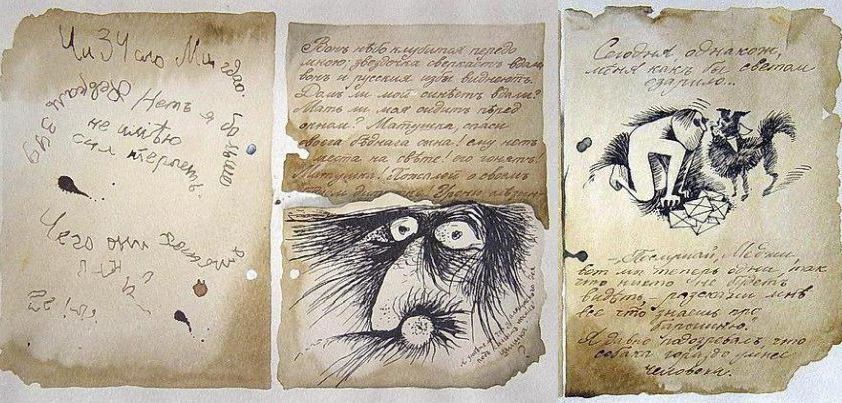 This humorous story from Nikolai Gogol charts the descent of a government clerk into insanity. He dismisses his supervisor’s concerns about strange behavior as jealousy, becomes infatuated with his Department Head’s daughter, stalks the poor girl after overhearing a conversation between two dogs, reads their (the dogs’) letters, and finally suffers delusions of grandeur, believing himself to be the King of Spain. In the process, the story satirizes Russia’s bureaucratic wastefulness and obsession with titles and social status. The major theme is, of course, madness. Other themes: purposeless work, alienation, envy, wounded pride, class and (in the asylum) cruelty, suffering. More…
This humorous story from Nikolai Gogol charts the descent of a government clerk into insanity. He dismisses his supervisor’s concerns about strange behavior as jealousy, becomes infatuated with his Department Head’s daughter, stalks the poor girl after overhearing a conversation between two dogs, reads their (the dogs’) letters, and finally suffers delusions of grandeur, believing himself to be the King of Spain. In the process, the story satirizes Russia’s bureaucratic wastefulness and obsession with titles and social status. The major theme is, of course, madness. Other themes: purposeless work, alienation, envy, wounded pride, class and (in the asylum) cruelty, suffering. More…
The News from Ireland
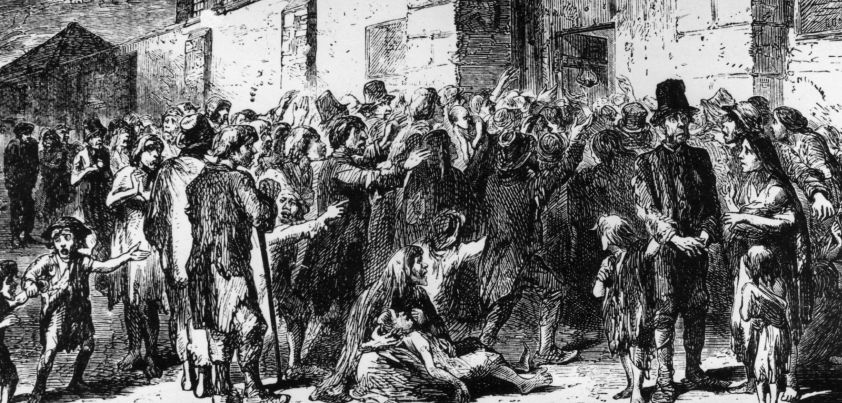 This story from William Trevor is set during the Irish Potato Famine of the 1840s. It contrasts the comfortable lives of those living behind the walls of a large English-owned estate with the misery of the rural poor. The issues are considered from multiple points of view, including those of servants and staff. Two major themes are acceptance and complacency. Although the plight of the rural poor initially disturbs newcomers, they soon become desensitized to the suffering, considering it a normal aspect of Irish life. Other themes: the gap between rich and poor, heritage, gender roles, religious faith and conflict. More…
This story from William Trevor is set during the Irish Potato Famine of the 1840s. It contrasts the comfortable lives of those living behind the walls of a large English-owned estate with the misery of the rural poor. The issues are considered from multiple points of view, including those of servants and staff. Two major themes are acceptance and complacency. Although the plight of the rural poor initially disturbs newcomers, they soon become desensitized to the suffering, considering it a normal aspect of Irish life. Other themes: the gap between rich and poor, heritage, gender roles, religious faith and conflict. More…
Bartleby the Scrivener: A Tale of Wall Street
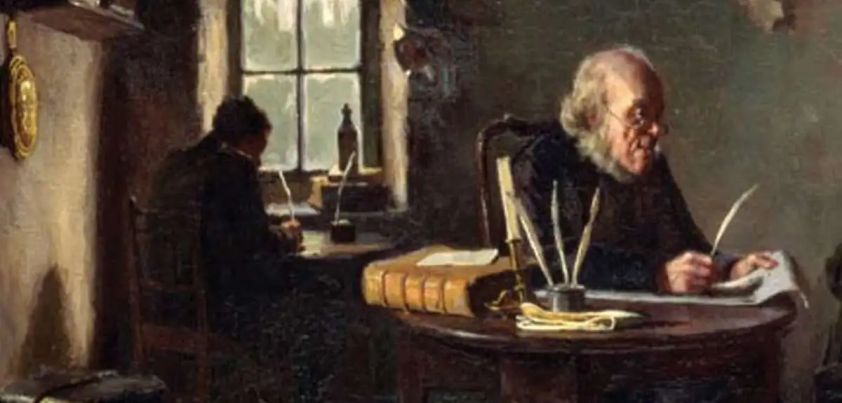 Herman Melville’s Bartleby the Scrivener is regarded as a classic of Modern Literature. A major theme is the depression that comes with being alone in the world and lacking a purpose in life. Other themes include exploitation, insensitivity and guilt (the Lawyer), conformity and coping with boring, repetitive work (Turkey and Nipper), alienation, apathy and passive resistance to one’s responsibilities (Bartleby), and loss of hope and the inevitability of death (symbolized by the Dead Letter Office). The Lawyer’s final words, Ah, Bartleby! Ah, humanity!, reflect the irony of Bartleby finding himself in the two worst possible jobs for his disposition. More…
Herman Melville’s Bartleby the Scrivener is regarded as a classic of Modern Literature. A major theme is the depression that comes with being alone in the world and lacking a purpose in life. Other themes include exploitation, insensitivity and guilt (the Lawyer), conformity and coping with boring, repetitive work (Turkey and Nipper), alienation, apathy and passive resistance to one’s responsibilities (Bartleby), and loss of hope and the inevitability of death (symbolized by the Dead Letter Office). The Lawyer’s final words, Ah, Bartleby! Ah, humanity!, reflect the irony of Bartleby finding himself in the two worst possible jobs for his disposition. More…
Boule de Suif / Ball of Fat
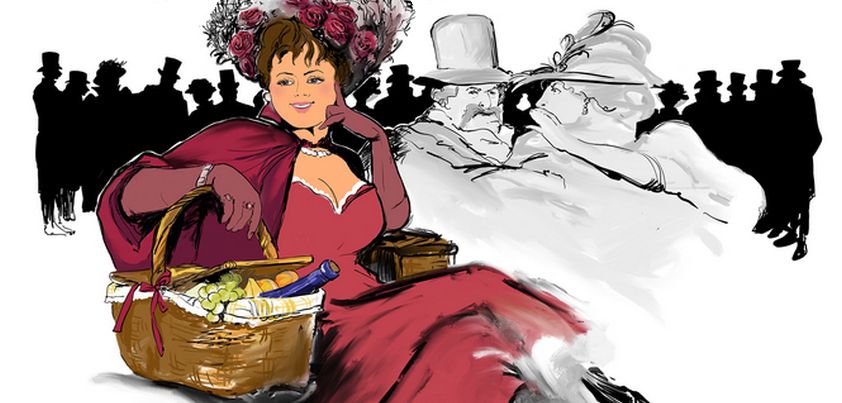 Regarded as one of Guy de Maupassant’s greatest works, this story explores the interactions between a prostitute with the unfortunate nickname Boule de Suif (Ball of Fat) and nine other coach passengers fleeing the Franco-Prussian War. Her fellow travelers comprise a cross-section of “respectable” French society: politics, business, the nobility and religion. Maupassant’s sad message about nineteenth-century France is that no matter what shows of kindness or sacrifices people of the lower classes make, they are unlikely to be treated with respect and dignity by those of higher social standing. Themes: social class, patriotism, manipulation, exploitation, sacrifice/moral compromise, ingratitude, hypocrisy. More…
Regarded as one of Guy de Maupassant’s greatest works, this story explores the interactions between a prostitute with the unfortunate nickname Boule de Suif (Ball of Fat) and nine other coach passengers fleeing the Franco-Prussian War. Her fellow travelers comprise a cross-section of “respectable” French society: politics, business, the nobility and religion. Maupassant’s sad message about nineteenth-century France is that no matter what shows of kindness or sacrifices people of the lower classes make, they are unlikely to be treated with respect and dignity by those of higher social standing. Themes: social class, patriotism, manipulation, exploitation, sacrifice/moral compromise, ingratitude, hypocrisy. More…
A Spinster’s Tale
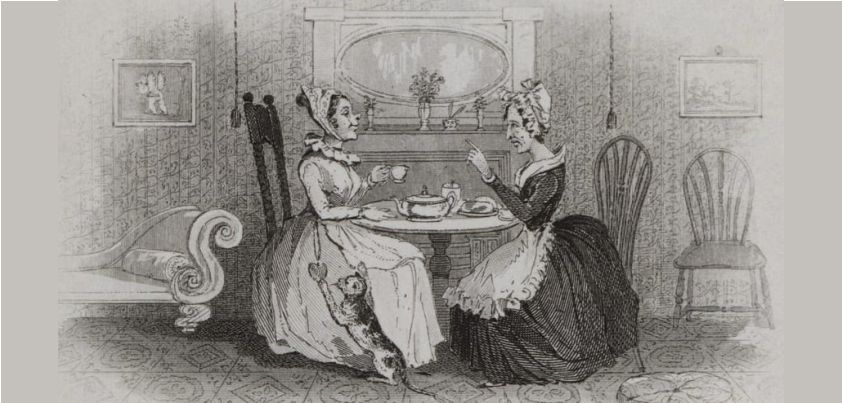 In this story by Peter Taylor, an aged woman looks back at a traumatic period in her youth that may have shaped her life and led to spinsterhood. Her mother’s religious condemnation of alcohol sets the scene for the story. The subsequent loss of her mother following a still-birth, growing up in a (drinking) male-dominated household, and her phobia about the town drunk at a critical period in her life (as she enters puberty) leave her isolated and in fear of the masculine world. Themes include family dynamics, personal growth, isolation and loneliness, fear, cruelty, sexual conflict. More…
In this story by Peter Taylor, an aged woman looks back at a traumatic period in her youth that may have shaped her life and led to spinsterhood. Her mother’s religious condemnation of alcohol sets the scene for the story. The subsequent loss of her mother following a still-birth, growing up in a (drinking) male-dominated household, and her phobia about the town drunk at a critical period in her life (as she enters puberty) leave her isolated and in fear of the masculine world. Themes include family dynamics, personal growth, isolation and loneliness, fear, cruelty, sexual conflict. More…
The Diamond Mine
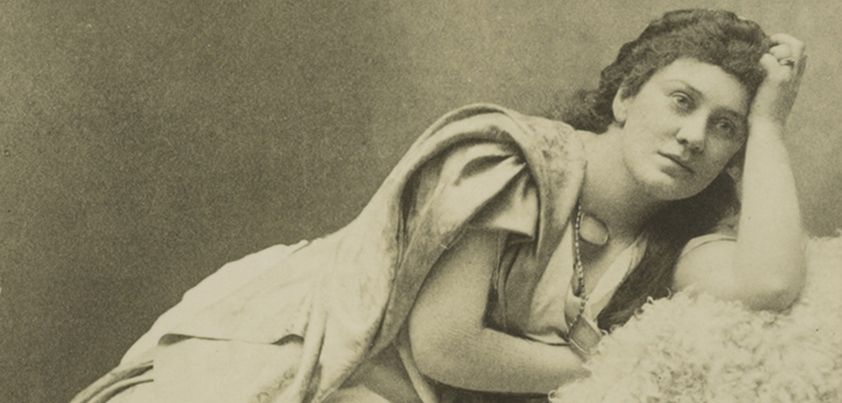 The Diamond Mine in this story by Willa Cather is an internationally renowned opera singer. The story highlights the emotional pressure associated with pursuing art for fame and fortune, rather than for art’s sake alone. The diva derives pleasure from “giving” to her husbands and extended family, most of whom ruthlessly exploit the poor woman. Although happy to bask in her fame, her vitality and success inspires envy and hatred among them. Their indolence and greed leaves her mined out, both financially and emotionally. Themes: the artist as a celebrity, vitality, envy, greed, exploitation, betrayal. More…
The Diamond Mine in this story by Willa Cather is an internationally renowned opera singer. The story highlights the emotional pressure associated with pursuing art for fame and fortune, rather than for art’s sake alone. The diva derives pleasure from “giving” to her husbands and extended family, most of whom ruthlessly exploit the poor woman. Although happy to bask in her fame, her vitality and success inspires envy and hatred among them. Their indolence and greed leaves her mined out, both financially and emotionally. Themes: the artist as a celebrity, vitality, envy, greed, exploitation, betrayal. More…
Young Archimedes
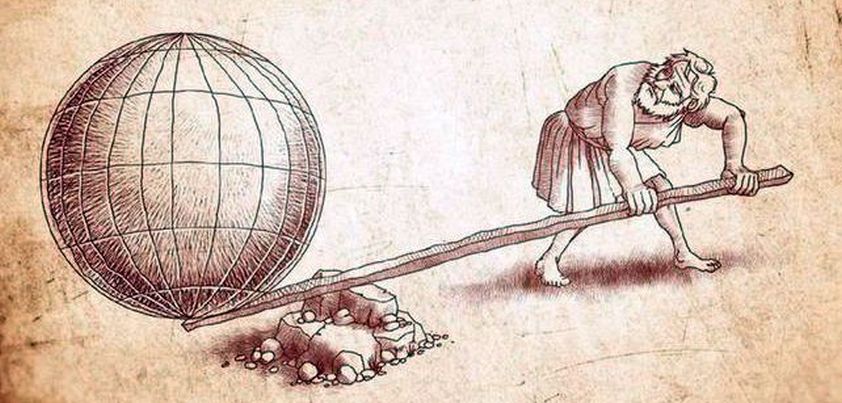 This tragic story from Aldous Huxley is about an English family renting a secluded Italian villa. When their young son is befriended by Guido, the son of a farm-worker, his father notices that in addition to being musically gifted, Guido has the makings of a math prodigy. While the family are holidaying in the Swiss Alps the childless, status-seeking wife of their landlord tricks Guido’s father into letting her take the boy away for musical instruction. The selfish woman tells Guido a terrible lie, with tragic results. Themes: greed, genius, family, class, social status, manipulation, abandonment, suicide. More…
This tragic story from Aldous Huxley is about an English family renting a secluded Italian villa. When their young son is befriended by Guido, the son of a farm-worker, his father notices that in addition to being musically gifted, Guido has the makings of a math prodigy. While the family are holidaying in the Swiss Alps the childless, status-seeking wife of their landlord tricks Guido’s father into letting her take the boy away for musical instruction. The selfish woman tells Guido a terrible lie, with tragic results. Themes: greed, genius, family, class, social status, manipulation, abandonment, suicide. More…
Jeffty is Five
 This story by Harlan Ellison is said to be an allegory of the power of childlike fantasy. The protagonist’s childhood friend remains “frozen in time”. As those around him age, the boy retains the body and mind of a five-year-old. Things get stranger when the protagonist discovers the boy is also living in the past. He tunes into new episodes of long discontinued radio shows, “sees” old movies when watching modern ones, and receives products from mail-order companies that no longer exist. Themes include childhood, friendship, nostalgia, past vs. present, desperation, the supernatural. More…
This story by Harlan Ellison is said to be an allegory of the power of childlike fantasy. The protagonist’s childhood friend remains “frozen in time”. As those around him age, the boy retains the body and mind of a five-year-old. Things get stranger when the protagonist discovers the boy is also living in the past. He tunes into new episodes of long discontinued radio shows, “sees” old movies when watching modern ones, and receives products from mail-order companies that no longer exist. Themes include childhood, friendship, nostalgia, past vs. present, desperation, the supernatural. More…
A Scandal in Bohemia
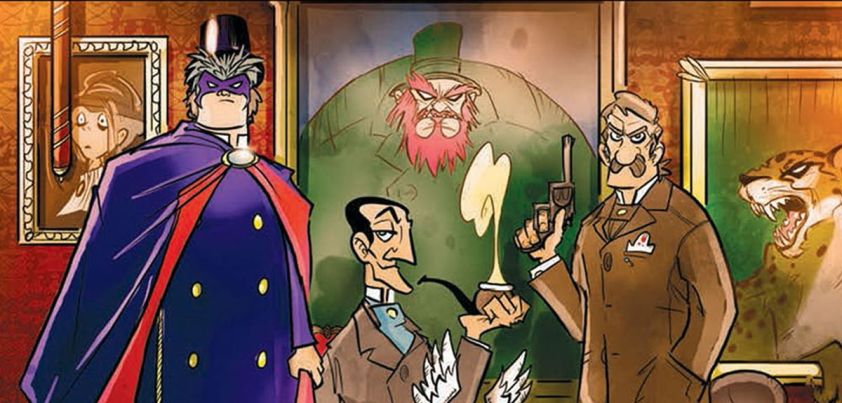 This is the first of Arthur Conan Doyle’s Sherlock Holmes short stories. The hereditary King of Bohemia hires Holmes to retrieve (steal!) photographic evidence of a scandalous affair. Uncharacteristically, the great detective underestimates the jilted woman and is unable to complete the assignment. Rather than displaying frustration or anger, Holmes is smitten… not with love, but with admiration for her intellect. Themes: philandering, class, sexism, deception, underestimating one’s foe, respect. Some say that Holmes’s esteem for Adler suggests a feminist theme. However, as Watson says, she is the woman; the only one he ever regards so highly. More…
This is the first of Arthur Conan Doyle’s Sherlock Holmes short stories. The hereditary King of Bohemia hires Holmes to retrieve (steal!) photographic evidence of a scandalous affair. Uncharacteristically, the great detective underestimates the jilted woman and is unable to complete the assignment. Rather than displaying frustration or anger, Holmes is smitten… not with love, but with admiration for her intellect. Themes: philandering, class, sexism, deception, underestimating one’s foe, respect. Some say that Holmes’s esteem for Adler suggests a feminist theme. However, as Watson says, she is the woman; the only one he ever regards so highly. More…
The Minority Report
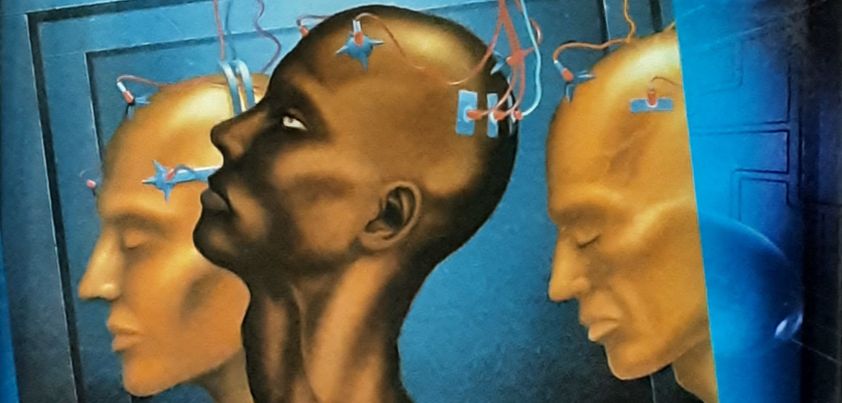 Philip Dick’s The Minority Report is a dystopian adventure story set in a society that takes policing a step even further than the infamous “Thought Police” in George Orwell’s Nineteen Eighty-Four. Its premise is that the authorities have found a way to identify a crime and imprison the would-be perpetrator before he or she even thinks of committing it. Their methods in doing this are disturbing to say the least. Themes: (general) free will vs. fate, injustice, trust vs. paranoia, self-fulfilling prophesy, extrajudicial murder; (for the “precogs”) violation of human rights, enslavement, degradation. More…
Philip Dick’s The Minority Report is a dystopian adventure story set in a society that takes policing a step even further than the infamous “Thought Police” in George Orwell’s Nineteen Eighty-Four. Its premise is that the authorities have found a way to identify a crime and imprison the would-be perpetrator before he or she even thinks of committing it. Their methods in doing this are disturbing to say the least. Themes: (general) free will vs. fate, injustice, trust vs. paranoia, self-fulfilling prophesy, extrajudicial murder; (for the “precogs”) violation of human rights, enslavement, degradation. More…